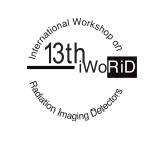Speaker
Dr
Grigore Moldovan
(University of Oxford)
Description
Whilst CCD imagers are replaced by CMOS chips in general consumer applications, there is an increased interest in the use of CMOS-based monolithic active pixel sensors (MAPS) for scientific and medical instrumentation. One of the important features that drives the adoption of this technology is its potential use for direct detection of radiation, which avoids the need for intermediate conversion to light and therefore improves the overall performance. A similar application area is imaging radiation in the MeV range with scintillators where the deposited dose in the imager is significant.
This work presents an investigation of useful MAPS lifetime under direct exposure to high-energy photons and charged particles, for a range of pixel configurations. Performance of conventional pixels is compared with that of pixels with a radiation-hard design, which include modified transistor and diode layout design and pixel architectures of increased complexity. Lifetime under direct exposure is obtained from highly accelerated stress tests that enable illumination to very high total radiation doses, and which illustrate worst case scenarios that do not allow for damage annealing and recovery. Mean time to failure and degradation rates at room temperature are obtained by monitoring pixel dark noise and gain degradation as a function of dose.
Experimental results show that the conventional pixel design does not provide sufficient lifetime for adequate applications under direct exposure, but that pixels with radiation-hard layout design of diodes, transistors and with adequate reset, can provide a lifetime on the range of 10 MRad. This study indicates that radiation damage is not a barrier in the adoption of CMOS-based imagers, provided that the CMOS design is employing standard radiation hardening procedures.
Author
Dr
Grigore Moldovan
(University of Oxford)
Co-authors
Mr
Andrea Fant
(ISDI Ltd.)
Prof.
Angus Kirkland
(University of Oxford)
Prof.
John Rodenburg
(University of Sheffield)
Prof.
Nigel Allinson
(University of Lincoln)
Dr
Osmond John
(Institute of Cancer Research and Royal Marsden NHS Foundation Trust)
Mr
Paul Kent
(University of Sheffield)
Prof.
Phil Evans
(Institute of Cancer Research and Royal Marsden NHS Foundation Trust)
Dr
Spyros Manolopoulos
(University Hospitals Birmingham NHS Foundation Trust)
Dr
Thalis Anaxagoras
(ISDI Ltd.)
